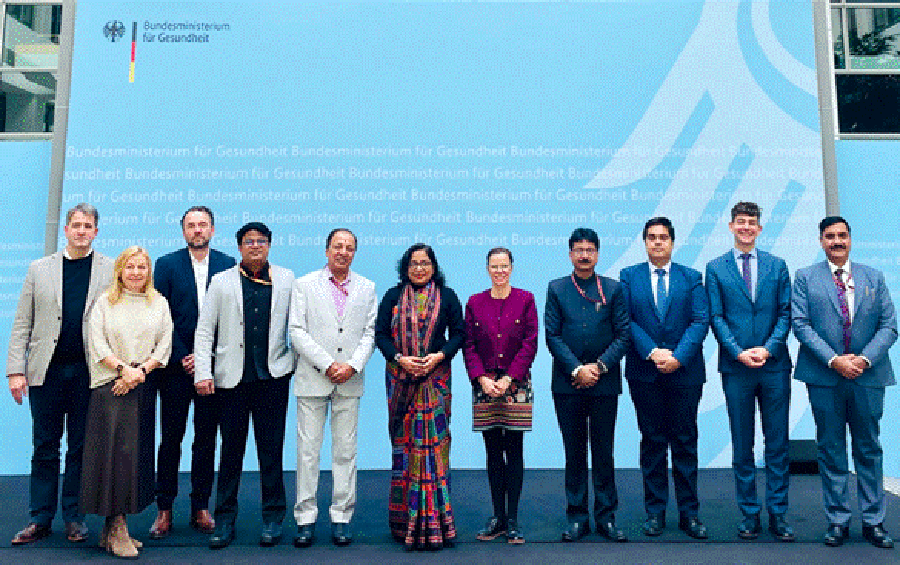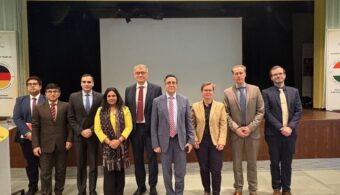Photo Credit: PIB
India and Germany have moved to deepen cooperation in traditional and integrative healthcare following the conclusion of the 3rd Joint Working Group (JWG) Meeting on Alternative Medicine held in Berlin from 18–20 November 2025. The meeting, involving senior health officials, researchers and regulators from both countries, reviewed ongoing collaboration and identified new pathways to bring traditional medicine into mainstream public health systems.
Officials described the discussions as a “significant step” in expanding evidence-based access to traditional therapies, aligning regulatory frameworks, and exploring the possibility of reimbursement mechanisms within Germany’s statutory health insurance system.
High-Level Delegations Review Progress, Chart New Priorities
The Indian delegation was led by Joint Secretary Monalisha Dash of the Ministry of Ayush and included:
- Prof. (Dr.) Rabinarayan Acharya, Director General, CCRAS
- Dr. Subhash Kaushik, Director General, CCRH
- Dr. Koustabha Upadhyay, Adviser, Ministry of Ayush
- Dr. Kashinath Samagandi, Director, MDNY
Germany was represented by senior officials from the Federal Ministry of Health, including:
- Paul Zubeil, Head of Division, European and International Health Policy
- Prof. Dr. med. Georg Seifert, Head, Competence Center for Traditional and Integrative Medicine, Charité Berlin
- Andrea Galle, CEO, BKK mkk (statutory health insurance fund)
- Dr. Jaqueline Wiesner, Head of Department, Federal Institute for Drugs and Medical Devices (BfArM)
Together, the delegations examined avenues for structured cooperation on the research, regulation and practical delivery of traditional and integrative medicine.
Integration, Reimbursement, Regulation Dominate the Agenda
According to the Ministry of Ayush, the JWG focused on three core priority areas:
Integrating Traditional Medicine into Public Health Systems
Both sides discussed models for expanding the role of Ayush systems and complementary therapies within mainstream hospitals and community health networks. The Ayush delegation showcased India’s experience with integrated care, including evidence-generation programmes and digital health tools for monitoring outcomes.
Building Insurance and Reimbursement Pathways
A detailed dialogue with German statutory insurers and the Federal Joint Committee (G-BA) examined the feasibility of reimbursing traditional medicine treatments under Germany’s health insurance architecture. The team was briefed on Germany’s decision-making processes, health technology assessments, and coverage standards for complementary medicine.
Strengthening Regulatory Approval Mechanisms
At the Federal Institute for Drugs and Medical Devices (BfArM), Indian officials discussed regulatory pathways for herbal products, homeopathic formulations, and therapeutic approaches. Germany shared its frameworks on safety evaluation, clinical data requirements, and pharmacovigilance.
The Ministry said these discussions reflect a “shared commitment… to foster evidence-based and people-centred traditional medicine practices.”
Site Visits Provide Ground-Level Insights into German Integrative Care
The Indian team held extensive engagements with German institutions that have established integrative medicine programmes:
Charité University – Competence Center for Traditional and Integrative Medicine
One of Europe’s leading medical universities, Charité discussed collaborative research with India and advanced work on a proposed Memorandum of Understanding (MoU) aimed at joint studies, curriculum development, and practitioner exchanges.
Community Hospital Havelhöhe
The delegation studied how integrative and anthroposophic medicine is practised in a clinical setting, including patient pathways, interdisciplinary treatment models, and outcomes documentation.
Federal Joint Committee (G-BA)
Meetings focused on Germany’s insurance and reimbursement processes, including how therapies are evaluated for inclusion and how evidence standards affect decision-making for alternative medicine.
India Sees German Partnership as Key to Globalising AYUSH
The Ministry of Ayush, in a statement, said the Berlin engagement aligns with India’s broader strategy to “globalise Ayush systems, create robust frameworks for evidence-based integration, and strengthen high-value international partnerships.”
It added: “Sustained collaboration with Germany will help accelerate research, regulatory harmonisation, and patient access to integrative healthcare solutions rooted in safety, quality and scientific validation.”
Officials emphasised that cooperation with Germany — a country with strong regulatory systems, research depth, and established insurance models — supports India’s efforts to position Ayush as a credible, scientifically validated pillar of global healthcare.
Broader Context: India Pushes for International Recognition of Traditional Medicine
The Berlin meeting follows a series of international engagements by the Ministry of Ayush aimed at strengthening India’s footprint in global health policy. In recent years, India has secured:
- WHO Global Centre for Traditional Medicine in Gujarat
- Bilateral MoUs with several European and Asian health systems
- Expanded academic and clinical research partnerships
Germany, meanwhile, has seen growing public interest in integrative and complementary medicine and is exploring structured evaluation models for incorporating safe, evidence-based traditional treatments.
The Road Ahead
Both sides have agreed to continue working on collaborative research programmes, harmonising quality and safety standards, developing stronger clinical evidence for wider acceptance, advancing the proposed India–Germany MoU on integrative medicine, and exploring mechanisms to improve patient access through insurance. Officials said the JWG will reconvene to review progress and move towards long-term frameworks for cooperation, noting that the Berlin meeting marks an important step toward building globally recognised, scientifically grounded, and patient-centred integrative healthcare solutions.



